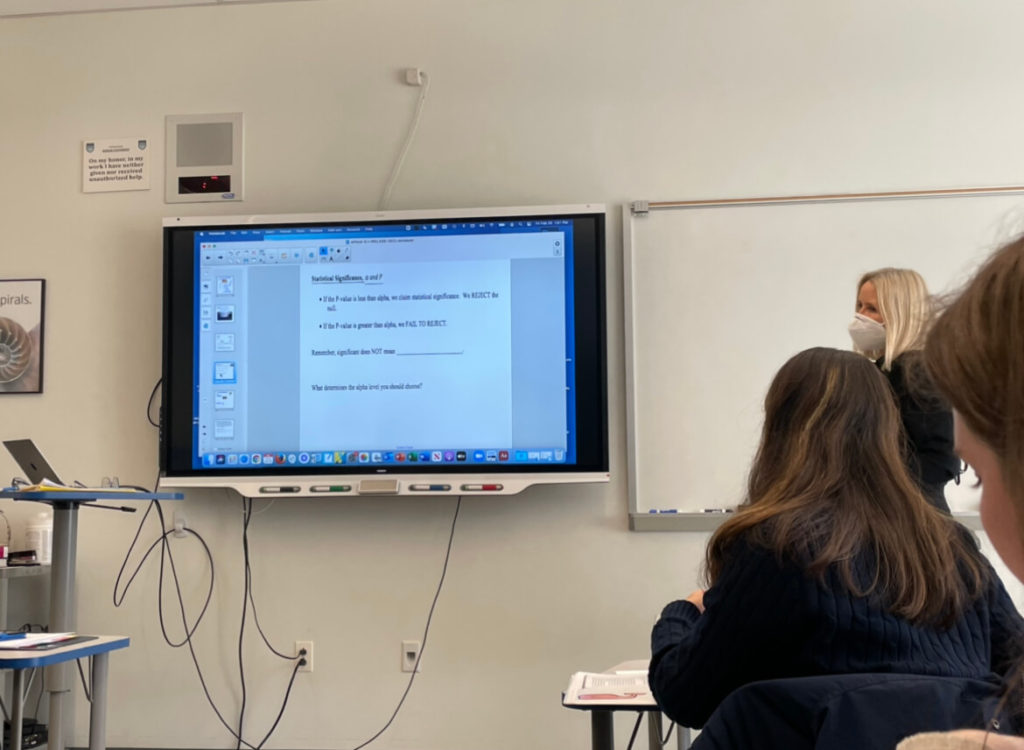Gray Collins ‘25 | Theo Engelman ‘25
Advanced Placement Classes have long been a staple at EA, and currently more than 20 AP courses are offered each year with many dozens of students attending these classes. Recently however, an AP committee has been scrutinizing whether or not to keep these classes at the school. Some independent schools in the area like Haverford and Baldwin have stopped their AP programs, while others such as Germantown Academy still have a strong array of AP classes.

Photo courtesy of Ashley Kennedy ‘22
The AP Committee consists of teachers and faculty members. Matthew Memmo, Computer Science Department Chair and member of the AP Committee, explains, “Mrs. Anderson is heading the committee. Mr. Letts is also an integral part, as well as many of the members of college guidance because the APs play an important role in the college process.”
Members of the committee are currently researching and analyzing the importance of AP classes. Memmo says, “The committee is being very thoughtful about looking at all aspects. For instance, we started out by looking at the history of APs in general and the history of APs at EA. We also looked at the stats. I was on a sub-committee group that was looking at all the different statistics related to APs, like how many we offer compared to how many APs that kids take. We’re really just looking at how big of a part of our program it is.”
The committee continues to take into account the arguments for and against AP classes at EA. Those opposed to AP classes say that they restrict students’ creativity and learning. Some teachers also complain that the AP system stops them from teaching what they want to because they must cover the information required for the exam. In other words, the rigid curriculum does not allow the teachers any room for deviation from the required material, especially if they get behind schedule.
Nik Walling ‘22 comments, “While I think the added academic rigor of AP classes is great, I have noticed over the years that many of my teachers disliked the idea of having to teach ‘to the exam.’ It’s extremely difficult for teachers to go beyond College Board’s mandatory curricula, especially because of the time crunch that the timing of AP exams causes. The freedom to dive deep on certain subjects and alter the pace or content of a class as needed is a flexibility that I think is ultimately impossible with APs.”
Although Memmo asserts that “the computer science department actually likes the APs because they meet our needs,” he also explains that if APs were removed, “I would probably take out some parts of the course. There would be less emphasis on test-prep, like practice multiple-choice and free response. There’s currently a good two or three weeks as we approach the AP test that are really dedicated to preparing for the test. That could be time that we get back to work on some other things. There would probably be a shift towards more project-based things, as opposed to exam-based assessments.”
On the other hand, AP’s proponents cite many reasons why EA should not abandon the system any time soon. Molly Konopka, a Middle and Upper School Latin teacher, currently teaches two AP classes and has been doing so on and off for 20 years. She feels that it would be wrong to discontinue these classes. “It’s a bad move,” she says, “It does set a standard by which we can actually quantify what we’re doing here.”
AP classes are standardized throughout the country, and the test is a benchmark used to measure students against their peers at other schools. Maya Gambhir ‘22 advocates for keeping the AP curriculum at EA, saying, “AP classes allow students to be well prepped for AP tests that can more easily compare them to kids across the country, as well as get them college credit, so they won’t have to repeat material they already know in college.” Kat Barber ‘23 also comments, “I think because a lot of colleges are becoming test optional, APs could be a greater focus for college admissions to compare applicants.”
Konopka also adds that parents “are looking for APs,” which is a consideration when selecting Episcopal over different schools in the area. Barber mentions, “I think the AP classes at EA make the school more desirable from a parent or family perspective. I know my parents were interested in AP classes being an option for me and my sisters.”
In addition, AP classes are college-level courses, giving students a better understanding of the rigor required attending college or university. Barber says, “A lot of my AP classes are pretty hard, so I guess it’s a reflection of what classes are going to be like in college. I think having classes that prepare me for college are important, but I also think the honors classes here are similarly difficult, so maybe AP classes aren’t necessary for that aspect of things.”
Ultimately, decisions about APs will not happen in the near future, as Memmo states, “There’s still a lot of work to be done. No decisions have been made. The committee is not even half way through it’s time, I would say.”
He believes that multiple outcomes are possible, saying, “We might just keep things as they are right now. It could also be possible that some departments drop APs and some don’t. The English Department doesn’t have APs, so there’s a precedent there for a department not to have APs. And then there’s the option of maybe disbanding APs. If the school decided to do away with APs, I think we would adapt and do just fine.”